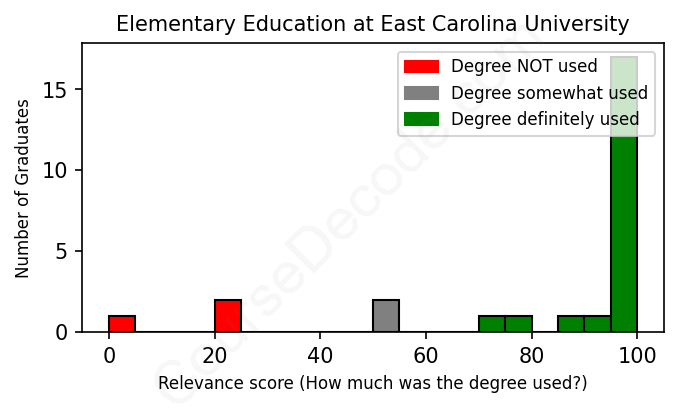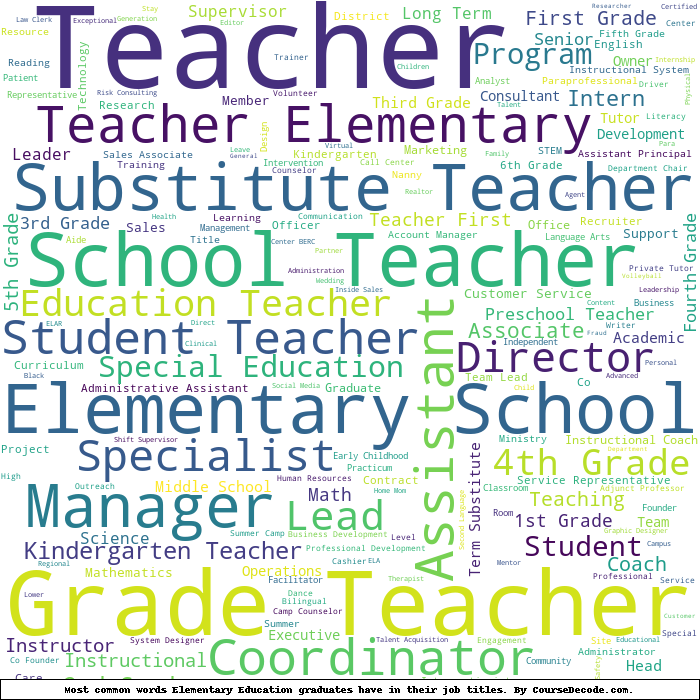
First, some facts. Of the Elementary Education graduates from East Carolina University we've analyzed , here's how many have used (or NOT used) their degree in their career:

These are estimates based on AI analysis of 26 LinkedIn profiles (see below).
The verdict? Significantly above average. Overall, with an average relevance score of 83%, Elementary Education graduates from East Carolina University have a much higher likelihood (+16%) of finding work in this field compared to the average graduate across all fields:
And for comparison, here's the chart for all profiles we've looked at across all degrees.
Also, after graduating, only 19% of these graduates have pursued further education other than another Bachelor's degree (such as a Masters degree or other), compared to the average across all profiles of 35%. This suggests a Bachelors degree is enough for most Elementary Education graduates, and it's normal to look for work straight after graduation.
See the details:
|
Relevance score: 100% We think this person has gone into a career highly relevant to their degree. We think this person has gone into a career highly relevant to their degree.
DEGREE INFOGraduated in 2012 from East Carolina University with a Bachelor's degree in Elementary Education. No other secondary education since. JOB HISTORY SINCE GRADUATIONTeacher Hoke County Schools Aug 2012 - Jun 2015 Teacher  Prince William County Schools Jun 2015 - Present ABOUTI am a 5th Grade Reading and Social Studies Teacher. I am very passionate about literacy in the classroom. |
The top 10 most common jobs done by the graduates we've analyzed (ranked most common to least) are:
From the list of jobs held by graduates of East Carolina University with a degree in Elementary Education, it’s clear that the majority have pursued careers closely tied to education. Most commonly, these individuals have taken on roles such as teachers across various school districts and even advanced positions like assistant principals and principals. Teaching positions at elementary schools seem to dominate the landscape, allowing graduates to apply their knowledge and skills in pedagogical practices, child development, lesson planning, and classroom management that they studied in their degree program.
While a significant portion of these jobs align with the qualifications from their Elementary Education degrees, there are instances where graduates ventured into roles that are not as closely related to education. Positions in marketing, youth ministry, and other non-educational fields were noted, suggesting a broader array of career exploration. Overall, though, most graduates have remained within settings where their educational training is directly relevant, affirming the degree's utility in fostering meaningful careers in teaching and educational leadership.
Here is a visual representation of the most common words in job titles for Elementary Education graduates (this is across all Elementary Education graduates we've analyzed, not just those who went to East Carolina University):

So, if we're looking at the career paths of graduates from East Carolina University's Elementary Education program, it seems like a lot of them are kicking off their careers in teaching-related roles. Many of these folks land their first jobs as classroom teachers, often right after graduation. For instance, graduates from 2011 to 2013 typically found their way into teaching positions at various public schools across North Carolina and beyond. Even years later, like after five or ten years, many are still in education, moving up the ranks to roles like instructional coaches, assistant principals, and even principals. That's a pretty solid trajectory if you ask me.
However, there's a bit of a mixed bag in terms of career sustainability and relevance. While a significant number remain in educational roles, some have ventured into jobs outside of teaching, dabbling in marketing and other fields. For example, one graduate who initially started as a teacher shifted into a marketing role after a few years. So, it looks like while many are on a fast track within the education system, a few have taken alternative routes, which suggests that having a degree in Elementary Education can lead to different career paths—though the teaching profession remains a substantial focal point. Overall, it seems like a degree from ECU in this field generally opens up good opportunities for a career in education, but not everyone stays strictly within that lane.
Getting a Bachelor's degree in Elementary Education at East Carolina University is pretty standard in terms of difficulty when compared to other colleges. Like most education programs, you'll have your share of coursework in child development, teaching methods, and classroom management, which can be a mix of fun and challenging. You'll also have hands-on experiences like internships or student teaching that can be pretty demanding but rewarding at the same time. Overall, it’s not the easiest degree out there, but it’s definitely manageable if you stay organized and passionate about working with kids. So, if you’re into it, you’ll probably find the journey enjoyable rather than overwhelming!
Most commonly, in the LinkedIn profiles we've looked at, it takes people 4 years to finish a Bachelor degree in Elementary Education.
Looking at the job paths of these East Carolina University graduates, it seems like the money they’re making varies quite a bit. Many of the graduates who started as teachers are still in education, which usually pays modestly, especially for those who’ve been in the game for a while. Some, like the graduates who took on roles as assistant principals or transitioned into marketing or specialized educational roles, likely have a better salary trajectory. However, a few graduates seem to be jumping around jobs, like one who went from teaching to various roles at Best Buy and a security position, which might indicate they’re not making as much as others who have stayed in teaching or moved steadily up in their careers. Overall, I’d say while some are probably doing okay financially, especially those in leadership positions, others might not be making as decent of a living as they could have with their degrees.
Here is a visual representation of the most common words seen in the "about" section of LinkedIn profiles who have a Bachelor degree in Elementary Education (this is across all Elementary Education graduates we've analyzed, not just those who went to East Carolina University). This may or may not be useful:

Here are all colleges offering a Bachelor degree in Elementary Education (ordered by the average relevance score of their Elementary Education graduates, best to worst) where we have analyzed at least 10 of their graduates: